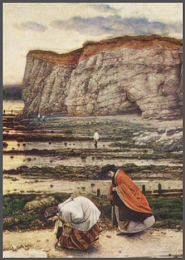 MVSA 2015 Seminar CFP
MVSA 2015 Seminar CFP
Victorian Sense and the Senses
University of Iowa
May 1-3, 2015
Deadline: October 1, 2014
Seminar Descriptions
Participants in MVSA seminars will write 5-7 page papers that will be pre-circulated to the other participants prior to the conference. During the seminars, the seminar leader and participants will identify important points of intersection and divergence among the papers and identify future areas of inquiry and collaboration. The seminar format allows a larger number of scholars to participate in MVSA and to seek financial support from their respective institutions to attend the conference and discuss a shared area of scholarly interest. Seminars are limited to 12 participants. All seminar proposals are due October 1, 2014. Seminar proposals that are not accepted may be submitted to the general pool of MVSA conference submissions, due October 31.
Victorian Science and Spiritualism
Seminar Leader: Professor Anna Neill, Department of English, University of Kansas
Spiritualized alterations of consciousness, or “dreamy mental states,” as the neurologist John Hughlings Jackson described them, are richly represented in Victorian imaginative texts, which record experiences ranging from brief shifts of awareness like déjà vu to protracted experiences of unreality like expanded reminiscence, double-consciousness, cataleptic trance or hallucination. Even as these altered states point toward the supernatural, they also draw on contemporary knowledge of the physical world (from psychology, evolutionary theory, or medical science) that is fundamentally respectful of scientific reasoning. Rather than exposing spiritual experience as nothing more than reflex nervous activity, however, the strange phenomena produced by dreamy minds might be said to constitute a spiritual dimension to realist depictions of Victorian social life.
This seminar welcomes papers on any topic that brings together Victorian science and spiritual experience. Examples are: the investigation of “rappings” and other spiritual phenomena; science and religion; visionary realism; psychology and spiritual experience; madness and genius; the science of mesmerism; prophecy and prediction; consciousness, the unconscious, the non-conscious; human brains and transhuman signals; trauma and transcendence. Send a 300-word abstract and 1-page CV (both as MWord documents) by October 1, 2014, to Anna Neill at aneill@ku.edu.
Food, Taste, and the Body
Seminar Leader: Chris Otter, Department of History, The Ohio State University
During the nineteenth century, the British diet underwent significant transformation. Consumption of meat, sugar, white bread and dairy products rose significantly, while the production of British food became an increasingly global enterprise. The British diet itself also became much more geographically homogeneous (witness the slow decline of the oatmeal-rich Scottish diet, for example) while remaining socially-differentiated. These transformations involved recalibrations of taste, as food became sweeter, more processed and richer in animal protein. They also catalyzed a series of dietary woes, including dyspepsia, stomach ulcers, constipation and weight gain, while anorexia nervosa emerged in its modern form during the period.
This seminar invites scholars interested in any aspect of the history of food, taste, and the body in Victorian Britain. Possible topics include, but are not limited to: Victorian dietary trends, crazes and fads (e.g. vegetarianism or carbophobic diets); the relationship between empire and diet; Victorian food aversions; the history of the British “sweet tooth”; the deepening nineteenth-century aversion to brown bread; class, diet and taste; gender and food habits; regional diets (their persistence or obliteration); the presentation of food; food and disgust; the Victorian stomach and bowels; the potential blindness of the Victorians to the global nature of the food they consumed; and food in Victorian fiction, poetry, and visual art.
Send a 300-word abstract and 1-page vita (both as MWord documents) by October 1, 2014, to Chris Otter at otter.4@osu.edu.
Mind-Body Matters: Picturing the Victorian Frame of Mind
Seminar Leader: Professor Nancy Rose Marshall, Department of Art History, University of Wisconsin
In the sonnet “Heart’s Hope” of 1871, Dante Gabriel Rossetti famously wrote “thy soul I know not from thy body,” characterizing a material form that was newly charged and elusively bounded. As physiology and psychology—or body and personality/spirit—became more closely interlinked in the Victorian period, an increasing acknowledgement that the “mind” was dependent on the “brain” highlighted the study of physical responses and sensations.
This session invites essays analyzing the changing definitions and understanding of the senses in Victorian Britain in light of new scientific investigations and theories, with an emphasis on—although not necessarily limited to—visual culture. Potential areas of inquiry include: art criticism as a way of managing or defining limits of vision; color and color theory; art’s relationship to the senses; the representation of memory; visual culture connected to Charles Darwin’s ideas of sexual selection and evolution; animal study; imaging the emergent fields of physiology neuroscience and psychology; classed, gendered or racialized sensory studies; sensation and spectacle; or mesmerism, spiritualism and the supernatural.
Send a 300-word abstract and 1-page vita (both as MWord documents) by October 1, 2014, to Nancy Rose Marshall at nrmarshall@wisc.edu.
For more information, please visit www.midwestvictorian.org.